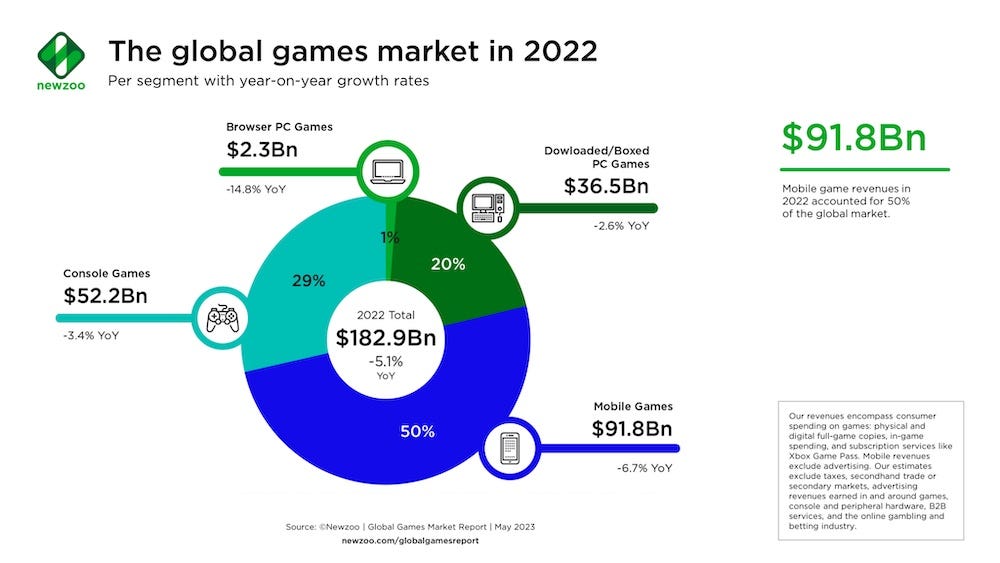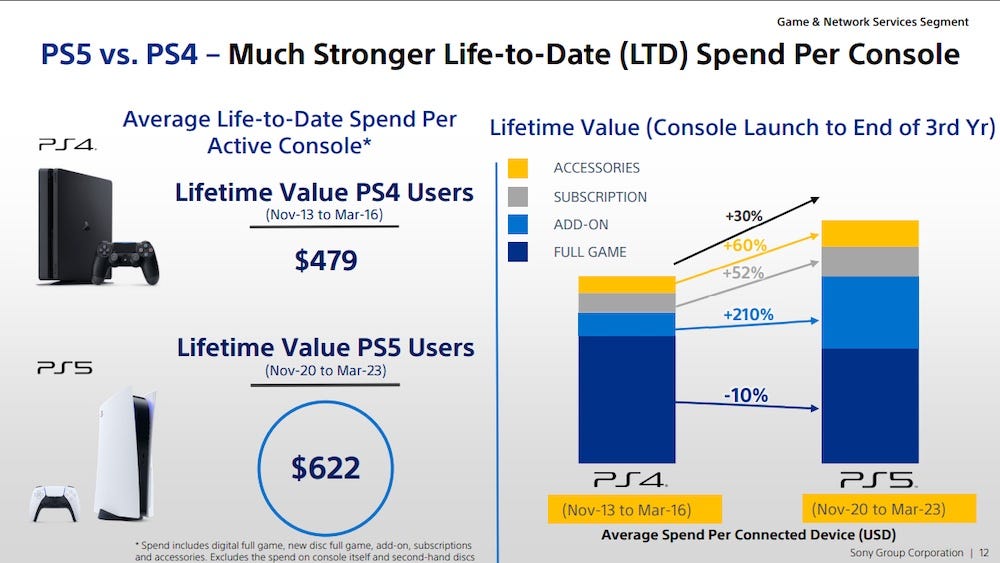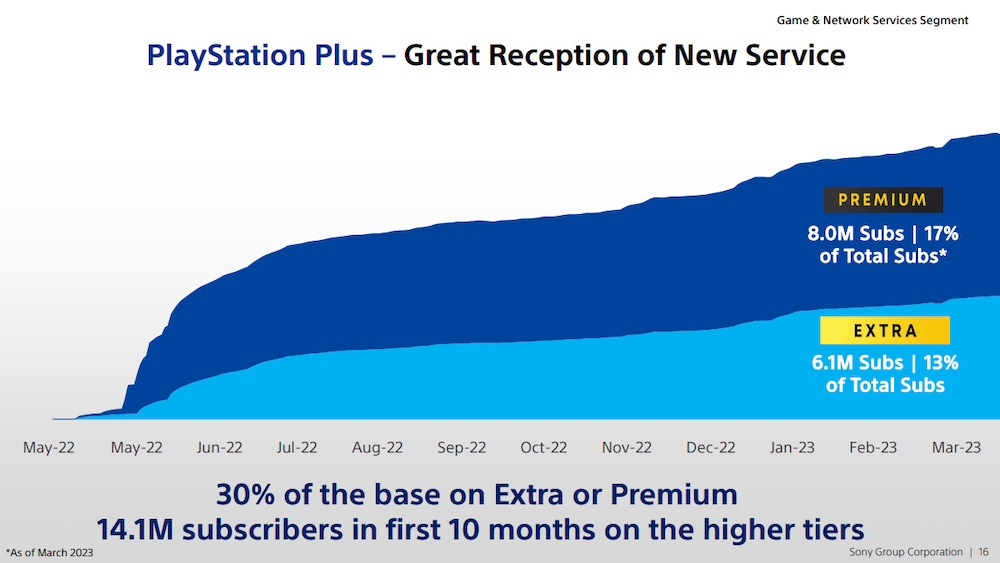Where's PlayStation - and Sony's games - headed in 2023?
Publikováno: 31.5.2023
Also: why can't we get these GaaS questions answered? And more...
[The GameDiscoverCo game discovery newsletter is written by ‘how people find your game’ expert & company founder Simon Carless, and is a regular look at how people discover and buy video games in the 2020s.]
We’re back - this time, with a dual look at PlayStation’s recent financial presentation and the general vibe from their PlayStation Showcase. It’s an interesting time to be at (or working with) Sony, alright…
And a final reminder: last to chance fill out our anonymous survey on your unreleased Steam games’ ‘follower to wishlist’ ratio. We’ve got a whopping 110 responses (yay!), but we’ll accept responses until Sunday, June 4th - so get on that!
[Could you support GameDiscoverCo & get mucho PC and console analysis and data? Yes? Our GameDiscoverCo Plus paid sub has an extra weekly ‘game trends’ newsletter, interactive Steam Hype/performance charts, eBooks, a member-only Discord & more. Sign up today.]
Sony: PS5 goes big, but can they land ‘live games’?
It’s interesting to see, in 2023, how much the major video game platform companies show in terms of data. Many of the publicly traded Western companies - especially Apple, and to some extent Xbox - trickle out abstract or topline data. (Valve is its own animal since it’s a private company, being radically transparent in some areas.)
But the Japanese-headquartered game consoles - Nintendo and Sony’s - have a history of exposing deeper data to financial shareholders. Which is why we get things like this three-hour Sony Business Meeting presentation - from which the ‘Games & Network Service’ section starring PlayStation starts at 10:17.
There’s a multitude of stellar data in the presentation, and we’ll include some of the slides throughout. But here’s the takeaway that we’re seeing on the PS5 hardware end:
Sony is making it very clear its supply-interrupted PS5 train is full steam ahead: the two slides above show how MAUs for PS5 are finally overhauling those for PlayStation 4, with lifetime value for PS5 users around 30%* ahead of PS4 at the same time in the cycle. (*not accounting for inflation, mind you.)
There’s evidence early PS5 adopters are more engaged than early PS4 ones: another slide notes than 71% of active PS5 consoles have paid PS+ subs, vs. 70% at this time in the PS4’s lifecycle. And 53% of all active PS5 accounts are paid store users, vs. 31% at this point in PS4’s rise to power.
Execs believe that PlayStation 5 can reach over 100 million units: It’s already at 38 million, and SIE chief Jim Ryan commented in the investor Q&A that “we should be able to exceed a figure of a further 70 million [which is the existing PS4 user base]”, since “we will definitely be successful in bringing in large numbers of gamers who did not own PlayStation 4, and in many instances have never owned any PlayStation.”
The meta-question here is probably - did the severe hardware shortages self-select early adopters who were motivated to track down a PS5 console, and so are more active players? We guess we’ll find out! But things sure are looking promising.
We also got extra data on how the PlayStation Plus game subscription tiers - which come in Essential, Premium, and Extra, we’d like to remind you - are doing. And we’re impressed - of the 47.4 million PS+ subscribers, 8m (17%) are now PS+ Premium, and 6.1m (13%) are PS+ Extra.
Frankly, that’s a better result than we expected. But it speaks to the large amount of existing subscribers that Sony has been able to nudge up the tiers, thanks to the better value proposition of Extra & Premium. (It’s only $40 a year more to upgrade from Essential, which gets you relatively little, to Extra, which adds hundreds more games.)
The overall number of PS+ subscribers is still relatively static, though - it was 45.9 million in September 2020, nearly 3 years ago. (We’re sure Xbox is having similar issues, given their continued lack of updates on how many Game Pass subs there are.)
[Side note: PlayStation VR 2 stats also cropped up in this talk. It started decently, selling just under 600,000 units in the first 8 weeks since launch, 8% better than the OG PS VR.]
Besides PS5’s surge, Sony’s big thrust recently is moving beyond owned hardware platforms & beyond ‘epic, play once and you’re done’ games. Let’s talk about that:
Sony’s Jim Ryan continues to play up first-party IP beyond Sony consoles: as the SIE chief said in the Q&A section: “We have a very deliberate and clear strategy of diversifying the exploitation of our IP away from the console space into other forms of gaming - PC and mobile, as well as a number of non game-related initiatives… already, our PC business is a significant profit contributor*.” (*Spider-Man PC now has >1.5mil sold, and The Last Of Us PC is at 368k despite technical woes.)
There’s lots of investment into Sony’s first-party live service titles: as The Verge covered, “In [the 2019 fiscal year], the [dev spending] split was 88 percent traditional games to 12 percent live service games, but in [the 2025 fiscal year], Sony expects that ratio to flip to 40 / 60.” Some of these, including Bungie’s Marathon and Haven’s Fairgame$ were teased in last week’s PlayStation Showcase.
The hit rate on live service games is low, so Sony’s going to be selective: in the Sony biz Q&A, PlayStation studios head Hermen Hulst said: “Historically, our games always work towards an end, and this is a large cultural shift. [In live services] the launch of a game is just the beginning, and that comes with a whole set of different KPIs. We also work with Bungie on a pretty rigorous portfolio review process that we apply to all 12 live service titles that we have in production.” (We’ve perhaps already seen this.)
End this whole arc, we scrawled a note to ourselves asking if Sony is “underestimating how much the PC/console ‘live services’ market is zero sum.” Which is to say - do you have to steal groups of players away from another game they are ‘maining’ to get them to play new live service games?
How difficult is that? Ask Warhammer Online how well it did dethroning World Of Warcraft in 2008, for example. And some titles like Fairgame$ are getting sentiment pooped-on already: “[This has a] ‘Thanks to all our players but we're unfortunately ending support’ 1 year later vibes to it”, says a YouTube commenter. (C’mon, we haven’t even seen gameplay yet!)
On the other hand, Bungie’s Marathon did a remarkably good job of launching hype-o-clock for the game. Perhaps it won’t just pull intrigued players briefly from Destiny 2, but also from longer-in-the-tooth extraction shooters like Escape From Tarkov. So there’s serious ‘blue sky’ here for standouts.
Finally: we never talked about Sony’s ‘Project Q’ cloud-streaming handheld, right? It’s specifically billed as“for playing games installed on your PS5 and streamed over WiFi”, and it may or may not be a curate’s egg, but we’re looking forward to hearing more.
Why can’t we get GaaS titles to discuss process?

Listen, GameDiscoverCo is generally a newsletter with information. We’ve never really run a section on why we… can’t get it? But we wanted to talk about what we’d love to see - and maybe why we don’t - with regard to big Games As A Service titles.
Specifically, we’ve had a couple of introductions to games in the space that have tens or hundreds of thousands of DAUs, for possible interviews. But they’ve ended up being declined after questions were sent over. Here’s the type of thing we’re asking:
Q: [Your game] has a super impressive and interlocking schedule of free updates, paid DLC, crossover DLC, etc. Can you talk about how far ahead you plan for updates? And what’s the rough team size working on them?
Q: How do you internally classify the update sizes - is there a scale or naming? (Alternatively, how do you explain it to players? What nomenclature do you use in terms of seasons, years, and DLC types?)
Q: Do you run each ‘level’ of updates on separate tracks with separate project managers, or do the same team work on everything? What is the most challenging part for you of juggling small, medium and large updates and keeping the game running?
Q: What kind of buffer do you need before launch on the DLC, given that it’s multiplatform? (How close to launch are they content complete, etc?)
These are super-interesting organizational questions that relate significantly to discoverability. And they’re good to think about, independently of actual answers from real studios. But why can’t we get people to talk about this? We speculate:
Too much transparency can spawn conspiracy theories: a famous early example of this is Maxis & Will Wright’s universe sim Spore - which was shown in 2005 in early form - had fans & then press insisting that fellow Spore creator Chris Hecker had “steered the game towards a simplistic, shallow, or casual design.” (Nope!)
Actual harassment of devs for GaaS games can be significant: the other week, EA’s Battlefield team had to put out a statement: “Recently we have witnessed increased harassment towards members of our development team… to maintain a healthy and open dialogue with our community, we will protect our teams and people from toxicity and harassment.”
‘How the sausage is made’ isn’t something larger companies need to show: when we have luck with transparency, it’s from smaller companies with somebody atop the organization who wants to show numbers or process. (Or from individual marketers who are allowed to share.) This info is a bigger, more complex ask with no real upside to providing.
Anyhow, this isn’t a ‘shame on you’ post to any of the companies who couldn’t share this - we get it. But it’s an ‘isn’t it interesting to think about these problems?’ reminder. (And if you are in a position to share this publicly or even pseudonymously for larger titles, ping us.)
The game discovery news round-up..

Finishing up this week’s free newsletters, let’s take a look at all the breaking - or just splintering - news that we’ve spotted in the game discovery and platform space:
Steam’s released a list/sale page of the platform’s top-grossing new games from April 2023, including big debuts like Wildfrost, Star Wars Jedi: Survivor, Crab Champions, and Boundary. (You’d already know these titles did well if you’re a GameDiscoverCo Plus subscriber - just sayin’.)
Newzoo's latest updated report “says that.. the global video games market hit $183 billion in 2022, down 5% year-on-year.” That’s $91.8 billion for mobile games (down 6.7%), $52.2 billion for console games (down 3.4%), and $36.5 billion for PC games (down 2.6%), for those paying attention.
‘Not-E3’ news: Devolver Direct, starring ‘long lost mascot’ Volvy, is happening on June 8th at 3pm PT, and will presumably be silly. Here’s a good updated list of all the various ‘not-E3’ streaming showcases - of which there are a fair few - btw.
Are you thinking about security measures for your Discord sufficiently? Andrew Pappas has a thread about this, since “there's been a HUGE increase in Discord hacks/takeovers targeting indie games”. A lot of the issues are around admins/mods being socially engineered into installing malware, and mitigating is important.
Enjoyed this Jared J Tan piece, ‘How to approach marketing if you hate marketing - or it’s starting to burn you out’, pointing out a few PoVs - approaching marketing as a fan, an experiment, a designer, or as yourself. These can help lighten the load of talking about your game constantly.
The CMA vs. Microsoft x Activision prelim hearing revealed the appeal against the blocked merger is taking place in late July, but Activision lawyers also pushed their key argument: “The notion that the player might be in a position to switch between cloud streaming and native gaming through the very same piece of hardware.” Basically: you can cloud stream on Xbox, so your market definition sucks, CMA?
Nintendo had already suspended eShop payments in Russia after the 2022 invasion of Ukraine, but new documents suggest it’s closing its Russian division permanently. As a result: “Russian customers with an existing Nintendo Account will be able to redownload digital content that they have previously purchased”, but that’s it.
Console subscription updates: some neat June adds to Xbox Game Pass include Amnesia: The Bunker & (wait for it!) Slayers X: Terminal Aftermath: Vengance of the Slayer; PlayStation Plus’ Essential tier is getting NBA 2K23 (upsell opportunities for IAP!), Jurassic World Evolution 2 and Trek to Yomi in June. Oh, and PS+ yearly subs will be 25% off for for June’s ‘Days Of Play’ digital sale.
One platform - Steam - checked in with another - Nintendo - about the legality of hosting the Wii and Gamecube emulator Dolphin Project, and the project has been removed from Steam, after Nintendo sent over a legal letter. (Not surprising, but notable nonetheless.)
Interesting microlinks: why video games still have trouble getting crediting right; the UK government released a ‘video games research framework’ for good quantitive surveying to be built on top of; Myst creator Cyan’s latest game, Firmament, somewhat unexpectedly uses AI to fill out art, in-game journals and some voice acting.
And that’s about all we have for this week! See you soon in Discoveryland, and don’t eat too many pretzels from the concession stands while you’re here.
[We’re GameDiscoverCo, an agency based around one simple issue: how do players find, buy and enjoy your PC or console game? We run the newsletter you’re reading, and provide consulting services for publishers, funds, and other smart game industry folks.]


